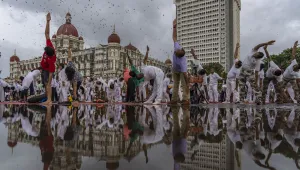DARFUR has grabbed the attention of the nation. Activist groups have done remarkable jobs of raising awareness of human suffering and have deterred starvation for millions of people in Darfur. Millions of dollars in aid — mostly from the United States — have reached this group of displaced people. However, this success is fragile.
Advocacy groups can violate the "do no harm" mandate when they attempt political recommendations that make no empirical sense in the context of the country, its regime, and the conflict. They cause harm to efforts by those working on the ground and on the peace process. They act on incomplete information and send mixed signals to the Sudanese government. In addition, they send oblique signals to the rebel groups, implying that the United Nations and the United States will sweep in and put them in power. This has stunted the peace process.
By imposing sanctions on the Sudan, the United States applies stick-shaking pressure on the central government — only one group in a multiparty civil war. Unfortunately, it does not hold unilateral power to stop the war, and sanctions harm potential allies.
Throwing "bellicose rhetoric" of military action at the central government, according to Alex De Waal of Harvard's Global Equity Initiative, only makes Khartoum more belligerent, more hard-liner, and less cooperative. It is saber-rattling while 2 1/2 million people's livelihoods and cultures disappear in the camps only to be replaced by a creeping institutionalized culture of handouts from the West — destroying citizens' ability to work while the men sit waiting for their guns.
The warring groups fight on. In addition, rebel groups now attack the African Union and the nongovernmental organizations, stealing their vehicles and further obstructing humanitarian aid. The militias fight each other and the rebels. The central government is unable to control and disarm the proxy troops they have unleashed, and can't control their own troops at times.
At a recent rally, General John Lueth Ukec, the Sudanese charge d'affaires in Washington, pointed out that a large percentage of the Sudanese Armed Forces that conducted the brutal campaign against the South were indeed from Darfur. This factor complicated any possibility of counterinsurgency by the government forces against the rebel uprising in Darfur.
The government's poorly chosen and much-regretted strategy of the moment was to hire the landless Bagarra nomads (Janjaweed) who had prior grievances against the largest Darfur tribe, the Fur, to squelch the rebellion. These same Janjaweed groups had been armed by Libya in the 1980s during its campaign to 'Arabize' Chad. This brutality has simply changed patrons. Libya is now happily arming the Justice And Equality Movement rebels (JEM) while talking peace.
If the United States gave a quarter of the time, money, effort, and high-level diplomatic attention to reaching a peace agreement that it has on UN force rhetoric, no-fly zones, and threats to invade Darfur, there might be peace. Realistically, it would take several years to gather and deploy 20,000 blue hats in Darfur. Without a political settlement, UN troops would be introducing yet more arms into an already chaotic situation.
Though a UN troop presence might bring the rebels to the peace table, it does not constitute a sustainable solution to a multiparty civil war. The Comprehensive Peace Agreement of 2005 that brought an end to the 21-year North/South civil war introduced important institutional changes that map out security and power-sharing arrangements. These arrangements must be extended to Darfur.
The United States engaged an extremely effective A-team to start the peace talks in Darfur with Robert Zoellick, but rushed a solution before the rebel groups had time to assess the agreement offered them. Then the United States dropped the ball.
Peace in a nation that has been at war most of its 50 years of independence is a long and complicated process. If the United States is not prepared to stay the course in finding solutions and then in helping the parties involved to learn the new processes of power-sharing and democracy, it risks losing its alliance with the moderates and reformers who are rapidly siding with the hard-liners. We have already seen the consequences of US actions without strategic mission plans and endgames.
Marie Besancon is a fellow with the International Security Program of the Belfer Center for Science and International Affairs at Harvard University's Kennedy School of Government.
Besançon, Marie. “Facing a Fragile Situation in Darfur.” The Boston Globe, August 9, 2007





